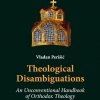The festivities in honor of our Holy Father Justin in Chelije Monastery is an opportunity to liturgically come together with pastors of our Church from communities geographically far from us. Bishop of Western America, His Grace Dr. Maxim (Vasiljevic), one of the most educated hierarchs of the Serbian Orthodox Church today, gave a beautiful homily of Chelije’s spiritual giant, calling this beautiful feast at the calendar summer’s dawn, Justinday.
As we are having this conversation at the Chelije monastery, on the feast of our Holy Father Justin, our topic – in a way – comes on its own. What does Father Justin mean to you as a theologian and pastor of God’s Church?
Bishop Maxim: Saint Father Justin is a representative of the “theology of surprise” because at every one of our encounters with him, in reading his works, eternals truths are given to us, but in a new manner. This is a characteristic of truly great theologians and Bishop Atanasije (Jevtic) rightfully calls him a “new theologian”. His language is crystal clean and clear and doxologically rich. He has enriched the Serbian language, theology and philosophy. It is known that he was one of the founders of the Serbian philosophical society (with Branislav Petronijevic, 1938, in Belgrade). Also, the translation of Father’s books into Greek brought about the coining of new words : “охристовљење“, “христопис“, “еклисиопис“… Father Justin always opens new horizons of theology.
The social environment during Fr. Justin’s life was accompanied by unbelief and an open persecution of the Church. Today, the faithful are faced with other temptations. What can we learn from his example that is important our own endurance on the path of faith?
Bishop Maxim: Fr. Justin was a man of love and truth. He theologized in love, revealing the misconceptions of this world. He was the one to enlighten, who is in the truth and rejoices, and gives incentive to the one in error to leave it, to “sober up” and return to the path of Christ.
Father Justin is a reliable guide for bishops, a reminder for pastoral interaction with the faithful. Not out of our authority, but love, humility …. As we notice, he calls every man. He has gathered us today at Chelije at the Divine Liturgy and calls us to great councils. Next year, in 2016, the Great pan-Orthodox Council will be held in Constantinople (Istanbul). With his sharp language and pen Father Justin has “branded” certain “deviations”, or the approach to the preparation of the council during his time. Today, his disciples (Metropolitan Amphilohije of Montenegro and the Coastlands and Bishop Irinej of Backa) are among the participants of the preparations of the Ecumenical council.
What do you specifically mean by “deviations”?
Bishop Maxim: At that time the approach to the tradition of the Church was very “rigid”. The themes for the council were the calendar, marriage, and similar items instead of witnessing Orthodoxy today in the world. “We don’t want cabinet (office; management), bureaucratic topics at the council, but the living ones,” Fr. Justin would say. He was able to wake the conscious. Besides Father’s disciples, among the participants of the council are those who were not his disciples directly, but they grew in his example. For instance, the president of the Committee for Preparing Topics for the Council, Metropolitan John Zizioulas of Pergamon highly respected Fr. Justin.
Father Justin is always the moderator for he speaks to us of the themes of the Gospels and the Saints.
Holiness is a timeless theme and challenge for all of us to live by the example of God’s people, right?
Bishop Maxim: Father Justin used to say that the lives of the Saints show us how a plowman becomes a saint. Or a shoemaker, mailman… In recent times, for example, a model or a web designer. Of course, also a newsman. We are all in need of the seventh force as a corrective.
You are Bishop of Western America, far from the homeland. What is the spiritual life and life in general in that part of the diaspora?
Bishop Maxim: The Diaspora lives in the spirit of that old adage “I’m not here, and there is no there”. It’s as if we have one foot in one boat and the other in another. But, this is a blessing. Someone had said that the people in the diaspora can do something people in the homeland cannot – to witness Orthodoxy among the heterodox, open horizons for new people and bring them to the faith. We see this in the exemplary marriages of Serbs and Americans. Of course, for all of this prayer is necessary!
Your Grace, thank you very much for the conversation and relay our prayers and greetings and blessings to your spiritual children!
Bishop Maxim: To God be thanks! Gladly!
Conversation: Jadranka Jankovic




